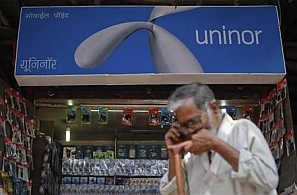In January, Norwegian telecom giant Telenor sent Morten Karlsen Sorby (below, left), to India as CEO of Uninor, its Indian telecom venture. By then, Uninor had reached operating break-even in all six circles in India. Upon coming here, Sorby, who had been taking care of Telenor’s corporate strategy and regulatory affairs, had to take a call on Uninor’s participation in spectrum auction in February. He chose not to bid aggressively, an unexpected move for the industry. Rather, Uninor picked up top-up spectrum in existing circles. The company will always look for “value-driven growth” and will focus on ‘sabse sasta’ (cheapest of all) data services to play a long-term game. Sorby speaks to Sounak Mitra on Uninor’s next plan of action. Excerpts:
 A company that has reached operating break-even in all circles, and has every option to expand pan-India, Uninor’s participation in the spectrum auction was limited. Was it a conscious decision?
A company that has reached operating break-even in all circles, and has every option to expand pan-India, Uninor’s participation in the spectrum auction was limited. Was it a conscious decision?
Our strategy is to approach mass market with affordable basic services, both voice and data. With the acquisition of spectrum in Assam, which has about 30 million people and around 40 per cent teledensity, in the recently-concluded auction, we now cover 700 million people. For us, it is more important to serve our customers better in existing circles rather than going for pan-India operations. We have taken additional spectrum in existing circles after examining the potential in other circles. This shows our keenness for growth, and we’ll continue to look for value-driven growth where we find it attractive. This time, we thought this is the best way for us.
So you plan to grow in existing circles just by adding new subscribers?
For us, growth is a combination of fresh customer acquisitions and increasing presence in the coming years, as and when opportunities come. We will come up with new concepts, different from what we offer today. Data is the next growth area. We plan to offer basic internet services like e-mails, social networks, instant messaging applications and basic surfing to our customers to meet their basic data requirement. And we will be the low-cost data service provider, in tune with our strategy of being ‘sabse sasta’. We will launch these services shortly.
But you offer basic data services
Yes, we do offer basic data to our customers, and at present, about 25 per cent of our user base is an active data user. Twelve to 15 per cent of our revenue comes from non-voice services. And data consumption is growing at about 70 per cent every month. We are finding most cost-efficient ways of operations, and we operate at 30 per cent more efficiently. We’ll launch a bouquet of data services. We are working on possible data services for specific target segment, like agriculture, education, financial services, etc. However, we are yet to finalise this. Over the next six months, we will add 5,000 new base stations to ensure better coverage and efficiency. With this, our network coverage will increase by about 30 per cent.
It is not about 3G or 4G; it is about quality services that subscribers need.
 Considering that Telenor has deployed long-term evolution (LTE) service in five countries globally on the 1,800-MHz band, will you look at launching LTE on 1,800 MHz in India?
Considering that Telenor has deployed long-term evolution (LTE) service in five countries globally on the 1,800-MHz band, will you look at launching LTE on 1,800 MHz in India?
Our aim is to take internet for all. You don’t need costly smart phones for internet. We want to take internet to mass market. Basic internet services should be available on basic smart-feature phones. Internet on mobile is the future. We have liberalised spectrum, and we have done LTE deployment on 1,800 MHz band in five countries globally. As customers develop, we’ll deploy every technology that we may need to serve our customers batter.
Is acquisition the way to grow? Or would you look at trading and sharing of spectrum to spread in new circles?
My prime target is to tap the 700 million people in our existing circles. There is huge scope left. Our decision on participation in auction was based on merits and potential of growth in each circle. In the coming years, there will be more auctions and opportunities. Spectrum sharing and trading will definitely benefit the industry as a whole. We’ll look into all possible options for value-driven growth, and we’ll continue to grow at the rate we are growing now.
Telenor has increased its stake in Indian entity to 74 per cent. Will you go for 100 per cent soon?
While there is no decision as of now, Telenor has always supported and will continue to support. We’ll take 100 per cent control over a period of time.










